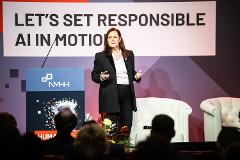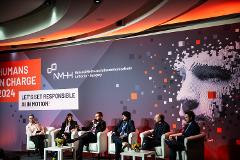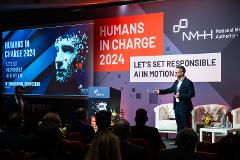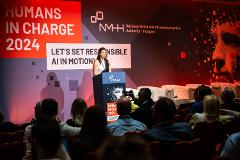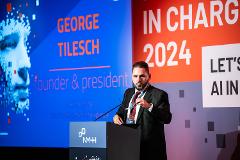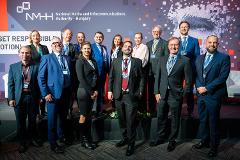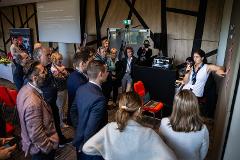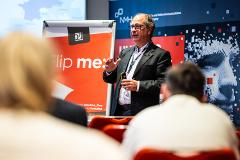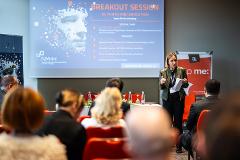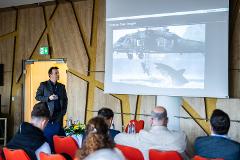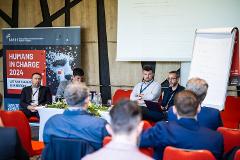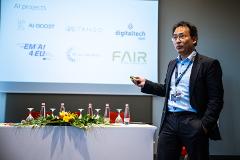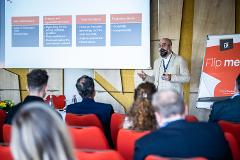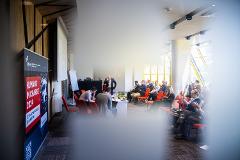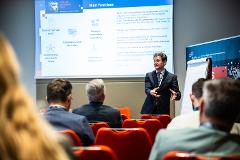2024 is a landmark year for the regulation of artificial intelligence
NMHH President András Koltay gives his speech at the 2024 Humans oin Charge AI conference in Hotel Helia, Budapest, October 7 2024
Speaking at the conference arranged by the NMHH for the second time, András Koltay drew attention to the opportunities and risks associated with artificial intelligence. In his opinion, it is necessary to create an environment in which innovation and the responsible use of AI “go hand in hand.”
AI is visibly leading to structural changes in all subsystems, stressed Mr. Koltay. However, if it is not applied wisely and developed ethically, it will do more harm than good. Indeed, the real work is only just beginning, he pointed out, noting that it is important that AI is “reliable, transparent and fair.” In the words of the President of the NMHH, the way artificial intelligence works is like a magic trick: it is a wonderful achievement, but it does not really have “depth.”
Artificial intelligence appears to make intelligent decisions, but these decisions are not signs of true consciousness or intelligence; they are merely the results of the underlying algorithms and data, he explained, adding that there are systemic questions about how the development of AI fits in with human values and societal norms. According to András Koltay, the question is what price society will pay for the benefits of artificial intelligence. How will it change information gathering, social dialogue, perception of reality or community building?
He pointed out that there were also questions about how to manage the impact of AI on the labour market and how to protect people's privacy. New rules need to be created, concluded András Koltay. “We need to support the operation that provides the means for the further development of AI, while preserving the protection of human dignity, freedom and security,” he underlined, adding that society will hopefully be protected from negative impacts.
According to Kay Firth-Butterfield, CEO of Good Tech Advisory, there is a need to embrace ideas that make society better, while preserving human diversity is also important for the future. Mario Hernandez Ramos, Chair of the Artificial Intelligence Committee of the Council of Europe, stressed that AI should be human-oriented and it should support people. He said that it was important to have a global dialogue on the use and development of AI. Most governments have their own national strategies on AI, but they have not yet been coordinated, he pointed out. Comprehensive regulation is needed, so that the companies concerned – including hospitals – can decide how to use AI and what their obligations are in that regard. Ansgar Koene, global head of AI ethics and regulation at Ernst & Young, welcomed the UN's opening of the discussion on the issue, and said that future plans were moving in the right direction. He added, however, that governments were not leading the way in investing in science, and that research funding needed to be sorted out. In his opinion, a joint effort is needed to allow countries and companies with money available for developments to move forward.
György Tilesch, international AI expert, President of the PHI Institute and the professional host of the event, stressed the need to create institutions and communities that are engaged in addressing the topic of AI. There is a need for a concentration of resources at a level never seen before, he said, adding that more and more conventions and legislation are being adopted, but it is difficult to keep up with technological progress. We need to develop the capacity to deal with the problems arising proactively, he noted. Brando Benifei, Member of the European Parliament and co-rapporteur of the EU's AI Act, said that the emergence of AI was “much more horizontal” and had an even wider impact than the appearance of the internet. “It's like electricity. It overrides everything”, he stressed. He said that not only rules were needed, but also the conditions for competitiveness. “It is important that our models and ideas do not just work on paper,” he underlined.
On the second day of the conference, experts shared their experiences in the framework of four panel discussions on various areas of artificial intelligence. Following the presentations, speakers not only discussed the topics with each other, but were also happy to answer questions from the audience.
The first session focused on the young generation and MI education where, among others, programme chair Csongor Herke, Head of Department at the University of Pécs and Cécile Aptel, Deputy Director of UNICEF's Innocenti – Global Office of Research and Foresight presented their views.
The second session focused on security and safety. Led by Mihály Zala, Head of Technology Risk and Cyber Security at EY, the session also covered AI and human rights, cybersecurity and data awareness.
The third session addressed issues and dilemmas in governance: AI4Gov, public service and citizen satisfaction. Chaired by Barna Miskolci, Chief Prosecutor of the Prosecutor General's Office, the discussion covered topics such as equipping public servants with AI skills and promoting the public good in the age of artificial intelligence.
The fourth session was chaired by AI legal expert Áron Badinszky. The discussion focused on frameworks, mechanisms and best practices for responsible AI. The workshop covered topics such as standardisation and certification.


